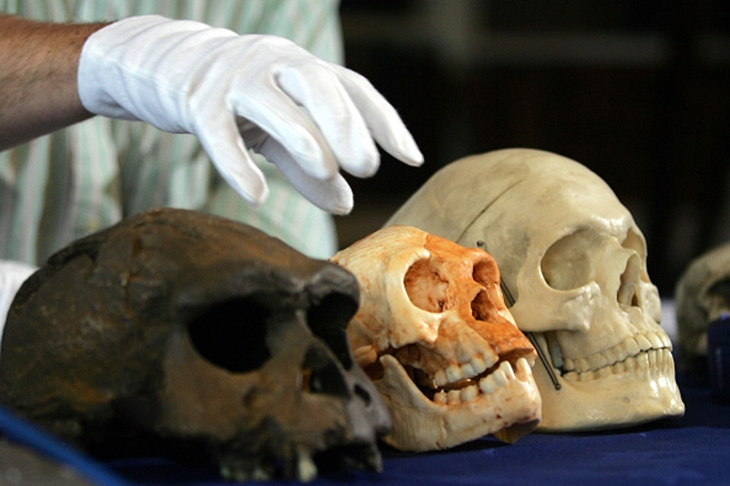This makes Brexit take a back seat: hints of ancient life have appeared on Mars. Carbon building blocks and other signs of past microbes are thought to lie in Jezero, a 28-mile-wide crater just north of Mars’s equator. The crater was once filled with a lake that was 800ft deep. Just imagine the sailing that went on among upper-class Martians 3.5 billion years ago. It was warmer back then — up there, that is — and that lake, I am certain, was where the elite met to eat and swim. And sail.
We humans have been evolving for some time now, but not really. Only a few decades ago we were certain that the oldest human fossil was a small-brained female by the name of Lucy. Lucy was known as Australopithecus afarensis, and she existed between 3.85 and 2.95 million years ago. Human evolution, it is believed, followed a direct path from Lucy to modern woman. Paris Hilton and Kim Kardashian, for example, are both direct descendants of Lucy. But Lucy was tiny, whereas Paris and Kim are not, and it seems that while the latter have increased in stature relative to Lucy, their brains have failed to keep pace. The brains of Paris and Kim should have grown in proportion with their breasts, but the opposite has happened.
Members of the #MeToo movement are also direct descendants of Lucy, but although they have grown physically much larger than she was, their brains, like Paris’s and Kim’s, have remained as small, if not smaller, than Lucy’s. This puzzles scientists almost as much as it does paleoanthropologists, and frankly it also baffles yours truly.
How can some women be quick enough to seize an opportunity to get publicity and money, yet possess a brain as tiny as that of sweet old Lucy? Some scientists insist that the bigger the breasts, the smaller the brains, but this theory has been disproved time and again, especially in experiments conducted in the Groucho Marx-Bob Hope institute of human evolution.
Please don’t laugh. Mine is a serious scientific attempt to find a solution to our never-ending quest to discover who we are and where we came from, and I shall begin with Homo — the first man, that is. Homo was taller than man is today and had very long legs for running. Eventually, the early Homo gave way to our very own Homo sapiens. Which means Lucy was not the first female species but only a branch in our family tree. How did I arrive at this conclusion? Easy. I read the Bible.
Now researchers have found fossils that prove that Lucy was not the first species in our hominin evolution because these fossils date back six million years. American feminists are disputing these findings, but then they would, wouldn’t they? Australopithecus, whose descendants I see on TV all the time, eventually gave way to Neanderthals, who I also see on TV, especially during reports from the Middle East. The best-preserved Neanderthal, not as a drawing in the Museum of Natural History, is a good friend of Jared Kushner and calls himself Mohammed bin Salman. He is sometimes referred to as prince, which is like calling a poisonous snake cuddly. Australopithecus and Neanderthal mixed for a while. Many of their descendants are now based in Washington DC and in London.
Neanderthals existed around 300,000 years ago, and they continued to live in areas across Europe and Asia until 40,000 years ago. Some insist that pure Neanderthals still exist in many parts of the globe, even after they began to mix with Homo erectus, our direct ancestors. As proof they point out the existence of Philip Green.
Homo floresiensis was discovered in Indonesia and was 3ft high, with a brain that was even smaller than that of Homo naledi. The ancestors of Homo naledi spread all over the southern hemisphere and eventually settled in Southern California and New York City. They grew horizontally rather than vertically, and are employed as traffic wardens in New York — and sometimes even as mayors, Mike Bloomberg being 3ft tall.
As it turns out, we have had the planet to ourselves only these past 40,000 years. Homo sapiens have been around much longer than that. So I’d like to know who else was around before that? Although he looks like someone from another planet, Jeff Bezos assures the media that his family had no connection with either outer space or the first Homo sapiens. He also says that having $150 billion is proof that there is no cure for baldness. But Bezos sure looks like one of those hominins that we outlasted or outcompeted 40,000 years ago. Another species, known as Zuckerbergin, has an outsized brain but one programmed to deceive.
Poor Lucy, I wish she were around.







Comments